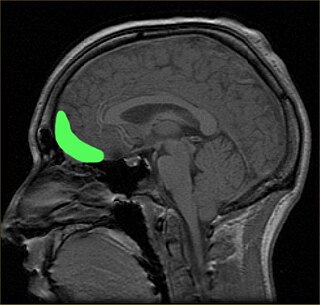Related Research Articles
In psychology, temperament broadly refers to consistent individual differences in behavior that are biologically based and are relatively independent of learning, system of values and attitudes.

Procrastination is the act of unnecessarily and voluntarily delaying or postponing something despite knowing that there could be negative consequences for doing so. It is a common human experience involving delays in everyday chores or even putting off tasks such as attending an appointment, submitting a job report or academic assignment, or broaching a stressful issue with a partner. It is often perceived as a negative trait due to its hindering effect on one's productivity, associated with depression, low self-esteem, guilt, and feelings of inadequacy. However, it can also be considered a wise response to certain demands that could present risky or negative outcomes or require waiting for new information to arrive.
The illusion of control is the tendency for people to overestimate their ability to control events. It was named by U.S. psychologist Ellen Langer and is thought to influence gambling behavior and belief in the paranormal. Along with illusory superiority and optimism bias, the illusion of control is one of the positive illusions.
In the psychology of affective forecasting, the impact bias, a form of which is the durability bias, is the tendency for people to overestimate the length or the intensity of future emotional states.
Impulse-control disorder (ICD) is a class of psychiatric disorders characterized by impulsivity – failure to resist a temptation, an urge, or an impulse; or having the inability to not speak on a thought. Many psychiatric disorders feature impulsivity, including substance-related disorders, behavioral addictions, attention deficit hyperactivity disorder, autism spectrum disorder, fetal alcohol spectrum disorders, antisocial personality disorder, borderline personality disorder, conduct disorder and some mood disorders.
Self-control is an aspect of inhibitory control, one of the core executive functions. Executive functions are cognitive processes that are necessary for regulating one's behavior in order to achieve specific goals. Defined more independently, self-control is the ability to regulate one's emotions, thoughts, and behavior in the face of temptations and impulses. Thought to be like a muscle, acts of self-control expend a limited resource. In the short term, overuse of self-control leads to the depletion of that resource. However, in the long term, the use of self-control can strengthen and improve the ability to control oneself over time.
Affective forecasting, also known as hedonic forecasting or the hedonic forecasting mechanism, is the prediction of one's affect in the future. As a process that influences preferences, decisions, and behavior, affective forecasting is studied by both psychologists and economists, with broad applications.
A hot-cold empathy gap is a cognitive bias in which people underestimate the influences of visceral drives on their own attitudes, preferences, and behaviors. It is a type of empathy gap.
Delayed gratification, or deferred gratification, is the resistance to the temptation of an immediate pleasure in the hope of obtaining a valuable and long-lasting reward in the long-term. In other words, delayed gratification describes the process that the subject undergoes when the subject resists the temptation of an immediate reward in preference for a later reward that is more favorable. Generally, delayed gratification is associated with resisting a smaller but more immediate reward in order to receive a larger or more enduring reward later. A growing body of literature has linked the ability to delay gratification to a host of other positive outcomes, including academic success, physical health, psychological health, and social competence.
Self-regulation theory (SRT) is a system of conscious, personal management that involves the process of guiding one's own thoughts, behaviors and feelings to reach goals. Self-regulation consists of several stages. In the stages individuals must function as contributors to their own motivation, behavior, and development within a network of reciprocally interacting influences.

In cognitive science and neuropsychology, executive functions are a set of cognitive processes that are necessary for the cognitive control of behavior: selecting and successfully monitoring behaviors that facilitate the attainment of chosen goals. Executive functions include basic cognitive processes such as attentional control, cognitive inhibition, inhibitory control, working memory, and cognitive flexibility. Higher-order executive functions require the simultaneous use of multiple basic executive functions and include planning and fluid intelligence.
Ego depletion is the controversial idea that self-control or willpower draws upon a limited pool of mental resources that can be used up. When the energy for mental activity is low, self-control is typically impaired, which would be considered a state of ego depletion. In particular, experiencing a state of ego depletion impairs the ability to control oneself later on. A depleting task requiring self-control can have a hindering effect on a subsequent self-control task, even if the tasks are seemingly unrelated. Self-control plays a valuable role in the functioning of the self on both individualistic and interpersonal levels. Ego depletion is therefore a critical topic in experimental psychology, specifically social psychology, because it is a mechanism that contributes to the understanding of the processes of human self-control. There have both been studies to support and to question the validity of ego-depletion as a theory.

In psychology, impulsivity is a tendency to act on a whim, displaying behavior characterized by little or no forethought, reflection, or consideration of the consequences. Impulsive actions are typically "poorly conceived, prematurely expressed, unduly risky, or inappropriate to the situation that often result in undesirable consequences," which imperil long-term goals and strategies for success. Impulsivity can be classified as a multifactorial construct. A functional variety of impulsivity has also been suggested, which involves action without much forethought in appropriate situations that can and does result in desirable consequences. "When such actions have positive outcomes, they tend not to be seen as signs of impulsivity, but as indicators of boldness, quickness, spontaneity, courageousness, or unconventionality." Thus, the construct of impulsivity includes at least two independent components: first, acting without an appropriate amount of deliberation, which may or may not be functional; and second, choosing short-term gains over long-term ones.
The spotlight effect is the psychological phenomenon by which people tend to believe they are being noticed more than they really are. Being that one is constantly in the center of one's own world, an accurate evaluation of how much one is noticed by others is uncommon. The reason for the spotlight effect is the innate tendency to forget that although one is the center of one's own world, one is not the center of everyone else's. This tendency is especially prominent when one does something atypical.
In psychology, manipulation is defined as subterfuge designed to influence or control another, usually in an underhanded manner which facilitates one's personal aims. Methods used to distort the individual's perception of reality may include seduction, suggestion, persuasion and blackmail to induce submission. Usage of the term varies depending on which behavior is specifically included, whether referring to the general population or used in clinical contexts. Manipulation is generally considered a dishonest form of social influence as it is used at the expense of others.

Inhibitory control, also known as response inhibition, is a cognitive process – and, more specifically, an executive function – that permits an individual to inhibit their impulses and natural, habitual, or dominant behavioral responses to stimuli in order to select a more appropriate behavior that is consistent with completing their goals. Self-control is an important aspect of inhibitory control. For example, successfully suppressing the natural behavioral response to eat cake when one is craving it while dieting requires the use of inhibitory control.
An addictive personality refers to a hypothesized set of personality traits that make an individual predisposed to developing addictions. This hypothesis states that there may be common personality traits observable in people suffering from addiction; however, the lack of a universally agreed upon definition has marked the research surrounding addictive personality. Addiction is a fairly broad term; it is most often associated with substance use disorders, but it can also be extended to cover a number of other compulsive behaviors, including sex, internet, television, gambling, food, and shopping. Within these categories of addiction a common diagnostic scale involves tolerance, withdrawal, and cravings. This is a fairly contentious topic, with many experts suggesting the term be retired due to a lack of cumulative evidence supporting the existence of addictive personality. It has been claimed that characteristics of personality attributed to addictive personality do not predict addiction, but rather can be the result of addiction. However, different personality traits have been linked to various types of addictive behaviors, suggesting that individual addictions may be associated with different personality profiles. The strongest consensus is that genetic factors play the largest role in determining a predisposition for addictive behaviors. Even then, however, genes play different roles in different types of addictions. Forty to seventy percent of the population variance in the expression of addictions can be explained by genetic factors.
Personality theories of addiction are psychological models that associate personality traits or modes of thinking with an individual's proclivity for developing an addiction. Models of addiction risk that have been proposed in psychology literature include an affect dysregulation model of positive and negative psychological affects, the reinforcement sensitivity theory model of impulsiveness and behavioral inhibition, and an impulsivity model of reward sensitization and impulsiveness.
Present bias is the tendency to settle for a smaller present reward rather than wait for a larger future reward, in a trade-off situation. It describes the trend of overvaluing immediate rewards, while putting less worth in long-term consequences. The present bias can be used as a measure for self-control, which is a trait related to the prediction of secure life outcomes.
References
- 1 2 3 4 Nordgren, Loran F.; van Harreveld, Frenk; van der Pligt, Joop (2009). "The Restraint Bias: How the Illusion of Self-Restraint Promotes Impulsive Behavior" (PDF). Psychological Science. 20 (12): 1523–1528. doi:10.1111/j.1467-9280.2009.02468.x. PMID 19883487. S2CID 13906112. Archived from the original on 2016-05-16.
{{cite journal}}: CS1 maint: bot: original URL status unknown (link) - ↑ Mann, Traci; Ward, Andrew (2007). "Attention, Self-Control, and Health Behaviors" (PDF). Current Directions in Psychological Science. 16 (5): 280–283. doi:10.1111/j.1467-8721.2007.00520.x. S2CID 7944824. Archived from the original on 2016-02-21.
{{cite journal}}: CS1 maint: bot: original URL status unknown (link)